9.0 kg 2-row pale malt
1.5 kg dextrose
290 g Belgian amber candi sugar rocks
70 ml homemade Belgian amberish caramel syrup
64 g EK Goldings (75 min boil, 5.5% AA)
23 g Czech Saaz (25 min boil, 3.6% AA)
21 g German Spalt Select (25 min boil, 4.8% AA)
(IBU should be ~30)
~1 tbsp yeast nutrient
Wyeast 3864 (Belgian/Canadian) yeast 1L starter generated from XL smack pack.
Process: Mashed in at 3.0 L/kg with a mash temp of 65 C for one hour. No mashout (see notes in pictures below). Boiled for 75 minutes, added candi sugar and syrup at 30 minutes left in the boil. Added dextrose in last 15 min of boil (which actually stopped the boil for a few minutes). Added yeast nutrient at 15 min boil too (was worried that I had too much sugar for fermentables)
OG = 20.3, expecting the beer to be ~9% alc/vol.
Anyway, on to some photos:
 I made the Belgian caramel syrup at home before hand. Its actually quite easy, the directions can be found at the bottom of this page. The first batch I made was too burnt and I'm sure it would have ruined the beer. My second try resulted in a perfect golden caramel syrup, I just didn't make enough... I only got 70 ml instead of 100 ml. I didn't want much since at most I wanted the caramel to be a very subtle flavour in the finished beer.
I made the Belgian caramel syrup at home before hand. Its actually quite easy, the directions can be found at the bottom of this page. The first batch I made was too burnt and I'm sure it would have ruined the beer. My second try resulted in a perfect golden caramel syrup, I just didn't make enough... I only got 70 ml instead of 100 ml. I didn't want much since at most I wanted the caramel to be a very subtle flavour in the finished beer.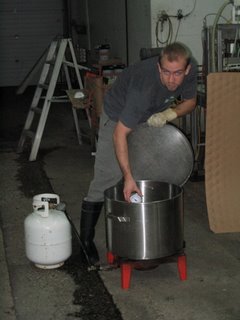 We started around 19:45 at night... perhaps an odd way to spend a Saturday night. Here I am heating up the strikewater to 71 C.
We started around 19:45 at night... perhaps an odd way to spend a Saturday night. Here I am heating up the strikewater to 71 C.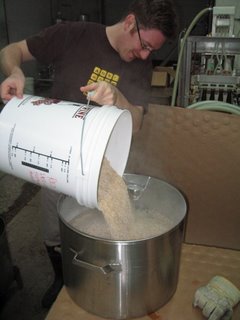 Graeme adding the milled 2-row to the strikewater. I love it when calculations work out perfectly, we hit exactly 65 C for our mash temp.
Graeme adding the milled 2-row to the strikewater. I love it when calculations work out perfectly, we hit exactly 65 C for our mash temp.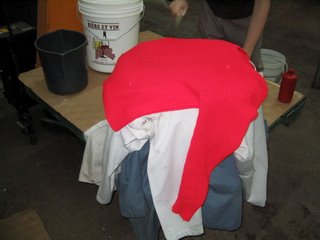 Too keep the mash from cooling off over the course of the hour, we covered the tun in sweaters and labcoats.
Too keep the mash from cooling off over the course of the hour, we covered the tun in sweaters and labcoats. Ingredients waiting for their moment to shine... the Belgian candi sugar, my yeast starter, and the caramel syrup. I made the starter two days previous with a 1.060 wort made from DME and some dextrose, which was kept in a room at about 23 C after pitching the XL smack pack.
Ingredients waiting for their moment to shine... the Belgian candi sugar, my yeast starter, and the caramel syrup. I made the starter two days previous with a 1.060 wort made from DME and some dextrose, which was kept in a room at about 23 C after pitching the XL smack pack. At the end of the mash we started running the wort into the boil kettle. We didn't do a mashout, as I figured that with the enzymes active for a longer time we might get maximum conversion. However, it seemed that the mash got a little stuck because of this (too cold) and in the end our extract wasn't very good (ending up with a 9.5% smaller batch that predicted). So I think next time I do such a beer I just let the mash rest for another 15-20 min and then mashout to a solid 78-79 C.
At the end of the mash we started running the wort into the boil kettle. We didn't do a mashout, as I figured that with the enzymes active for a longer time we might get maximum conversion. However, it seemed that the mash got a little stuck because of this (too cold) and in the end our extract wasn't very good (ending up with a 9.5% smaller batch that predicted). So I think next time I do such a beer I just let the mash rest for another 15-20 min and then mashout to a solid 78-79 C. Waiting for the boil to start. I don't think the propane burners have enough BTU power to get the boil going as much as I want it to for 40 L of boiling wort. When I do smaller batches (20 L or so) the boil is great, though.
Waiting for the boil to start. I don't think the propane burners have enough BTU power to get the boil going as much as I want it to for 40 L of boiling wort. When I do smaller batches (20 L or so) the boil is great, though.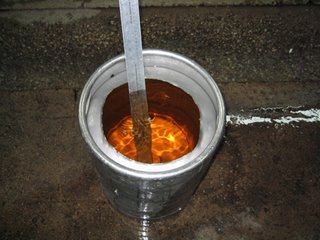 The night before I completed the first phase of my super-fermenter conversion of a 58.8 L keg. I used a grinder to cut the large hole you see in the top, creating an open fermenter. Here you see the product, filled with and iodine acid sanitizer.
The night before I completed the first phase of my super-fermenter conversion of a 58.8 L keg. I used a grinder to cut the large hole you see in the top, creating an open fermenter. Here you see the product, filled with and iodine acid sanitizer.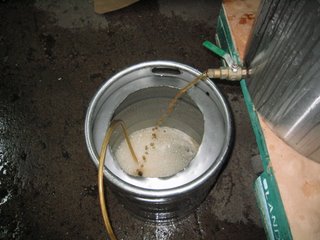 After the boil, cooling, and a short whirlpool, we started running off the wort into the fermenter. We let it dribble through the air, which will aerate it pretty well on the way down (but also has a higher chance of picking up some contamination, however I was confident that with my strong yeast starter the yeast would instantly take over the wort). The other tube you see going into the fermenter has an aeration stone pumping in filtered air, just to make sure the wort is well aerated.
After the boil, cooling, and a short whirlpool, we started running off the wort into the fermenter. We let it dribble through the air, which will aerate it pretty well on the way down (but also has a higher chance of picking up some contamination, however I was confident that with my strong yeast starter the yeast would instantly take over the wort). The other tube you see going into the fermenter has an aeration stone pumping in filtered air, just to make sure the wort is well aerated. Pitching the yeast.
Pitching the yeast.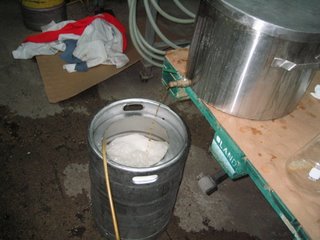 The fermenter being almost full at this point here, you can see how much foam is being formed which suggests that it is well aerated.
The fermenter being almost full at this point here, you can see how much foam is being formed which suggests that it is well aerated.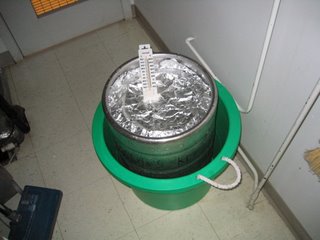 And finally, the fermenter full, covered, and put away in a nice warm furnace/hot water tank room. The room seems to hover between 20-23 C. I figure once the yeast get going and create their own heat they should be able to give themselves a nice high fermentation temp of 25, maybe even higher.
And finally, the fermenter full, covered, and put away in a nice warm furnace/hot water tank room. The room seems to hover between 20-23 C. I figure once the yeast get going and create their own heat they should be able to give themselves a nice high fermentation temp of 25, maybe even higher.Most of the flavour in this beer should come from the yeast character. The Belgian/Canadian strain is (apparently) used by Unibroue. Its character is described by Wyeast as "Mild phenolics, which increase with elevated fermentation temperatures. Low ester profile with a dry, slightly tart finish. Complex and well-balanced, alcohol tolerant". At higher fermentation temps (24-29C), the yeast should produce banana, clove, light phenolic, and fruity flavour profiles (S. Hieronymus, "Brew Like a Monk", 2005, pg 178).
I'm a bit worried that the beer will be much darker than "golden". It seemed that the wort was quite amberish without any sugar additions. I think its darker than I'm used to as it is a high gravity beer... the final runnings of the sparge were still at 7 plato, where with a normal batch of beer might be 1.5 plato... much more dilute. I was going for a nice golden-light-amber colour, but I don't really care I suppose (it is "Some Kind of Belgian" afterall...).


No comments:
Post a Comment